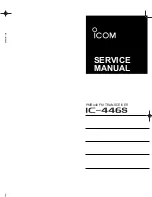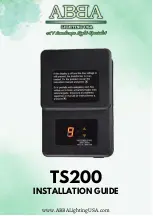
A07A2200S
with coloured noise as mentioned in the CCIR 559 rule (annex B). The process is described in the
IEC 244-13 standard and consists of modulating the transmitter with noise as above, with a
deviation equal to 32KHz. This work condition corresponds to the maximum allowed band
occupation and to a radio broadcast spreading dance-music which modulates ±75KHz.
At these conditions (modulated transmitter with coloured noise in accordance to CCIR-559)
there is the chance to have a reference of a radiophonic transmitter at frequency modulation
which occupies the maximum allowed spectrum and on which it’s possible to perform all the
modulation measurements repeatedly, having some parameters as results which can be
applied and compared on the field to modulation measurements of a network which is
broadcasting a normal music program.
The music signal can not be surely measured by a normal detector with effective or peak value,
differently from a fix tone signal. The measurement must be done, being not sinusoidal or other
periodical form, detecting the power of the signal self (function proportional to its instantaneous
value square) or the peak with very long observation periods.
7.2
Modulation peak analysis measurement
The CEPT 54-01 rule shows, in its paragraph
4.2,
how the peak measurement must be performed on
the modulation of a frequency modulation transmitter.
The maximum deviation peak must be found in a 50msec window, to be sure of catching also
modulating frequencies till 20Hz. At each minute 1200 representative peak modulation
samples are available.
These values, obtained with even many minutes long observation periods, will be placed into a
graph in the following manner:
on the abscissas, the frequency deviation will be placed with a deep scale of 150KHz
on the ordinates the number of samples of the corresponding deviation value will be placed
It maybe by extreme examples it’s possible to explain the concept better. Suppose to modulate the
transmitter with a fix tone having a deviation of ±75KHz and to perform the peak measurement in
object for a period of 10 minutes. Thus 12000 samples all with the value 75 will be obtained: the
graph will be of a single vertical line 12000 high and placed on the abscissa 75 (fig. 5.a).
On the opposite if we modulate the transmitter for 3 minutes with ±20KHz deviation, then
for further 3 minutes with ±40KHz and at last for further 3 minutes with ±50KHz and the
observation period fixed at 9 minutes we will obtain 10800 samples 3600 of which will have
abscissa 30, other 3600 samples abscissa 40 and the last ones abscissa 50 (fig. 5.b).
380 221 R02
Pag. 36
Summary of Contents for A07A2200S
Page 24: ...A07A2200S 380 221 R02 Pag 24 ...
Page 51: ...A07A2200S 380 221 R02 Fig 9 a ...
Page 54: ...A07A2200S 380 221 R02 23 REMOTE 24 AC MAINS INPUT ...
Page 85: ...DT50 100 manual 380 209 R00 Pag 77 AUDIOIN BOARD AUDIO INPUTS ...
Page 86: ...DT50 100 manual 380 209 R00 Pag 78 AUDIOIN BOARD AUDIO INPUTS ...
Page 87: ...DT50 100 manual 380 209 R00 Pag 79 AUDIOIN BOARD AUDIO INPUTS ...
Page 91: ...DT50 100 manual 380 209 R00 Pag 83 DLCD BOARD DISPLAY DRIVER ...
Page 92: ...DT50 100 manual 380 209 R00 Pag 84 DLCD BOARD DISPLAY DRIVER ...
Page 96: ...DT50 100 manual 380 209 R00 Pag 88 MBA BOARD MOTHER BOARD ...
Page 97: ...DT50 100 manual 380 209 R00 Pag 89 MBA BOARD MOTHER BOARD ...
Page 98: ...DT50 100 manual 380 209 R00 Pag 90 MBA BOARD MOTHER BOARD ...
Page 99: ...DT50 100 manual 380 209 R00 Pag 91 MBA BOARD MOTHER BOARD ...
Page 103: ...DT50 100 manual 380 209 R00 Pag 95 SINTD BOARD VCO OSCILLATOR ...
Page 104: ...DT50 100 manual 380 209 R00 Pag 96 SINTD BOARD VCO OSCILLATOR ...
Page 107: ...DT50 100 manual 174 1 74HC08D Gate 2 Input AND U1 DMPX BOARD STEREOCODER 380 209 R00 Pag 99 ...
Page 108: ...DT50 100 manual 380 209 R00 Pag 100 DMPX BOARD STEREOCODER ...
Page 109: ...DT50 100 manual 380 209 R00 Pag 101 DMPX BOARD STEREOCODER ...
Page 112: ...DT50 100 manual 380 209 R00 Pag 104 AGC BOARD AUDIO AUTOMATIC GAIN CONTROL ...
Page 113: ...DT50 100 manual 380 209 R00 Pag 105 AGC BOARD AUDIO AUTOMATIC GAIN CONTROL ...
















































